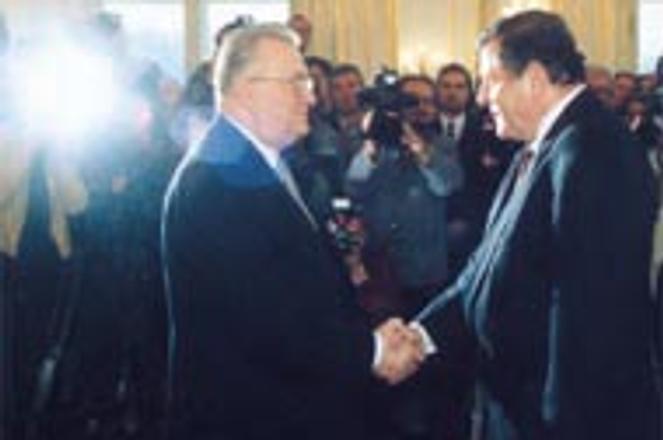The final act. President Michal Kováč shakes hands with Prime Minister Vladimír Mečiar putting and end to three years of bitter political struggle between the two former allies.Peter Brenkus
As now former President Michal Kováč stood in front of his black BMW, scanning a crowd of over 5,000 people who had gathered in front of the presidential palace to either mourn or celebrate his departure, his head tilted up toward a familiar neon board propped up on an apartment building across the street. The sign had the number zero on it. The joke was over, his time up. Kováč quickly ducked into his car and was driven away, thus ending Slovakia's first presidential era.
It must have been a strange moment for a man who had back in 1992 declared at a political rally: "There is [Vladimír] Mečiar, and then there is everybody else." For two years, Kováč and Mečiar were close political allies, who together in March 1991 had founded the Movement for a Democratic Slovakia (HZDS). Kováč's loyalty to Mečiar helped land him the nomination for president, a post which he won to become Slovakia's first president in March 1993.
All that changed after a speech in 1994 in which Kováč criticized Mečiar's governing methods, leading to a vote of no confidence in parliament and a defection of a third of HZDS deputies, who later reformed as a new party, the Democratic Union (DU).
Mečiar, stung by what he called a betrayal on Kováč's part, campaigned furiously to win the 1994 elections by a huge margin, 25 percent more than the second strongest party. From then on, he tried to oust Kováč from the presidency, but was unable to remove him in more than three years of trying. Almost four years to the date since their antagonism began, Kováč left on his own at the end of his regular term.
Kováč left with no successor in sight, which meant - thanks to a constitutional quirk - that some of his powers devolved to Mečiar's government. Mečiar could hardly contain his excitement at the ceremony marking the transfer of power on March 2.
The majority of the crowd, however, didn't share in his joy. Boos and chants of "Mečiar is a dictator," "Thieves!", "Launch Mečiar to the cosmos!", boomed from the fiery crowd for two hours. When Mečiar's motorcade arrived in front of the presidential palace, the prime minister seemed incredulous at the clamour, raising his hand in acknowledgement - a made-for-STV moment.
There were a few handfuls of people over 60 (mostly women) with Mečiar posters pushed flat against a fence separating the palace from the crowd. The rest of the crowd - students and young professionals - made a stark contrast with the elderly, suggesting that here and now, two different eras were clashing.
The ruckus outside was barely heard inside the palace, where the ceremony took place in the grandiose hall of mirrors. Journalists were jammed on the window side of the room and anxiously jockeyed for photo-op positions. The Slovak flag, flying over the prime minister's palace, could be seen directly across the vast presidential garden, which was a collection of murky dirt mounds thanks to reconstruction.
Mečiar and his full cabinet entered the room in silence. To one side stood Milan Čič, head of the Constitutional Court, with other judges. Six presidential advisors faced cabinet members while everyone awaited the president. For five minutes Mečiar, flanked by Ivan Gasparovič, speaker of parliament, and Augustin Marian Huska, chairman of the HZDS, stood stiffly.
At exactly 4:00 p.m. Kováč entered the room amidst applause, none of it coming from the cabinet. Čič gave a short reading of the constitution about the transfer of presidential powers. He closed the constitution, and gave the floor to Kováč.
The president gave a short speech in which the sound system didn't start working until half way through and then crackled during his last sentences. In the speech Kováč said, "It would be in the interests of Slovakia if intensive negotiations and the good will of all parties involved led to parliament electing a new Slovak president within a short time."
When he was finished, he met Mečiar in the middle of the room to shake hands. Kováč wished Mečiar success and peace for Slovakia as hundreds of clicks from cameras pattered off. He then shook hands with every member of the cabinet and walked back to his side of the room, turned and said "dovideňia" (good-bye). A microphone was brought to Mečiar, who without a word, turned his back and walked out followed by all his ministers. This was the start of a new era.
Minutes later, Mečiar and the cabinet filed outside in front of the palace. A red carpet was laid for the president's final review of his guard, standing in attention. A military band drowned out the crowd who whistled the entire time Mečiar stood outside. Kováč appeared and continued in the formalities, repeating his good wishes to each cabinet member and to Mečiar.
After Kováč sped away, Mečiar seemed almost giddy with excitement. He bounced on his toes and smiled broadly. Mečiar will call the presidential palace home until a new president is elected by parliament. He thus joins Kováč and Jozef Tiso, Slovakia's wartime president, as the only men to do so.
With victory sealed Mečiar gazed at the crowd catching sight of a green "Flubber" balloon (part of a Disney promotion of the new Robin William's movie distributed that day) rising to the sky. He followed the flight of this balloon for a long time, perhaps pondering its message. Someone had written the number 206 on it - the number of days until parliamentary elections.

